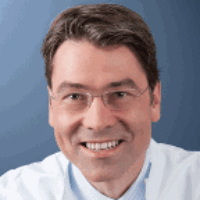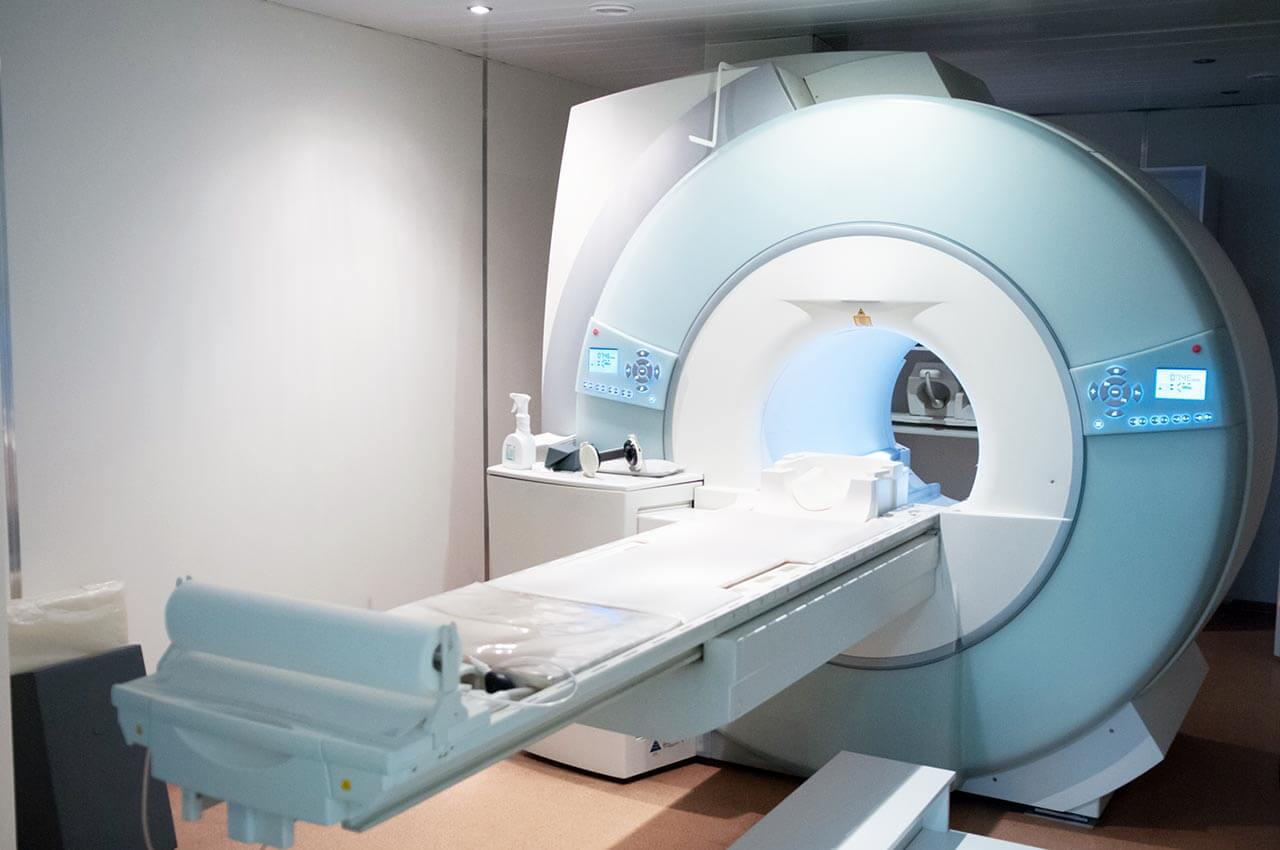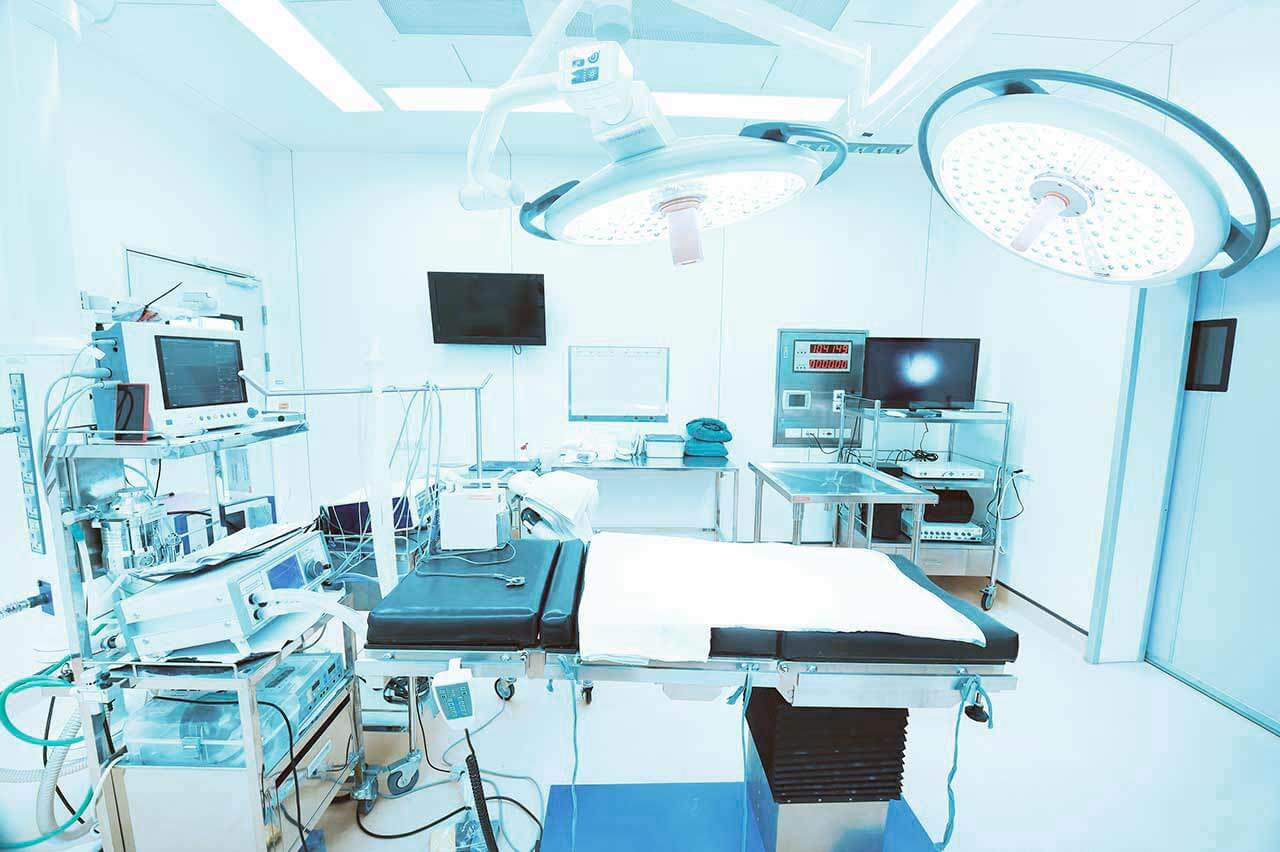
The program includes:
- Initial presentation in the clinic
- Clinical history taking
- Review of medical records
- Physical examination
- Neurological examination (if indicated)
- Laboratory tests:
- Complete blood count
- Biochemical blood tests
- Inflammation indicators (CRP, ESR)
- Coagulation tests
- Chest MRI/CT scan
- Preoperative care
- Endoscopic thymectomy
- Histological examination of the removed tissues (if indicated)
- Symptomatic treatment
- Cost of medicines and medical materials
- Nursing services
- Control examinations
- Full hospital accommodation
- Elaboration of further recommendations
Indications
- Treatment-resistant myasthenia gravis
- Thymus size under 8 cm
How program is carried out
Day 1. Initial presentation at the clinic. After consultation with the attending physician, examination and neurological examination, the patient undergoes the necessary laboratory and instrumental examination.
Day 2. On the 2nd day of hospitalization, after receiving the examination results and their assessment by the attending physician, the operation is performed under general anesthesia. The surgeon endoscopically removes the thymus gland and anterior mediastinal fat through the transcervical approach. With endoscopic surgery, there is no need to open the sternum, as the surgery is performed through a small incision in the neck. This allows the patient to recover faster after surgery and to reduce pain in the postoperative period. The operation ends with the suture of the soft tissues and skin. If necessary, drainage is installed in the anterior mediastinum. The patient is disconnected from the ventilator. After the restoration of spontaneous breathing he is transferred to the intensive care unit. As a rule, the operation lasts up to 1-1.5 hours.
From day 3. In the absence of complications and good general condition, the patient is transferred from the intensive care unit to a regular ward. If positive dynamics is present and complications are absent, the patient is discharged from the hospital on average at day 5.
Required documents
- Medical records
- Chest MRI/CT scan (not older than 3 months)
- Biopsy results (if thymic carcinoma is suspected and if available)
Service
You may also book:
 BookingHealth Price from:
BookingHealth Price from:
About the department
According to the Focus magazine, the Department of Adult and Pediatric Cardiothoracic Surgery at the University Hospital Tuebingen is included in the ranking of the top German departments specializing in the surgical treatment of cardiovascular diseases!
The department offers the full range of treatment of various diseases of the heart, blood vessels, organs of the respiratory system in adults and children. As part of the German Heart Competence Centre Tuebingen, the department is distinguished by the outstanding quality of medical care, competent specialists, as well as high-tech equipment of the latest generation. The department is headed by Prof. Dr. med. Dr.h.c. Christian Schlensak. He became the first specialist in the state of Baden-Württemberg, who performed a heart transplant in an infant.
The main clinical focuses of the department include:
- Surgical treatment of heart diseases
- Coronary artery bypass grafting
- Conventional coronary artery bypass grafting using a heart-lung machine
- Off-pump coronary artery bypass surgery
- Minimally invasive direct coronary artery bypass
- Total arterial myocardial revascularization
- Hybrid surgical interventions
- Surgical treatment of heart valve diseases
- Conventional method of heart valve prosthetics through minimally invasive access (MIC)
- Minimally invasive mitral valve reconstruction
- Transcatheter aortic valve implantation (TAVI)
- Surgical treatment of diseases of the thoracic aorta
- Surgical treatment of heart rhythm disorders (arrhythmias)
- Surgical treatment of heart failure, including implantation of heart mechanical support systems
- Coronary artery bypass grafting
- Surgical treatment of heart disease in children
- Correction of atrial and ventricular septal defects
- Tetralogy of Fallot treatment
- Correction of double outlet right ventricle
- Correction of partial or total anomalous pulmonary venous drainage
- Correction of the open atrioventricular canal
- Anatomical correction in transposition of the large vessels (including pulmonary stenosis)
- Univentricular correction of blood circulation using Fontan procedure
- Complex correction and treatment of hypoplastic left heart syndrome (Norwood procedure)
- Ross and Ross-Konno procedures
- Unifocalization in tetralogy of Fallot, accompanied by pulmonary atresia
- Heart valve reconstruction in Ebstein anomaly
- Care for adults with congenital heart defects
- Surgical treatment of thoracic diseases
- Surgical removal of tumors of the lungs and bronchus, mediastinal organs and chest wall
- Surgical removal of lung metastases
- Minimally invasive surgery (video-assisted)
- Chest wall plastic surgery
- Multimodal therapy for pleural mesothelioma
- Surgical treatment of vascular diseases
- Carotid artery reconstructive surgery (under local anesthesia)
- Surgical interventions on the abdominal aorta and the internal iliac arteries
- Interventions on the kidney and abdominal arteries
- Interventions on the arteries of the lower and upper extremities, including bypass surgery
- Formation of vascular access for hemodialysis
- Endovascular interventions
- Implantation of stent prostheses in thoracoabdominal aneurysm and aortic dissection
- Implantation of a stent prosthesis for abdominal aortic aneurysm (EVAR)
- Implantation of special prostheses for the treatment of anatomically complex aortic pathologies
- Hybrid interventions with surgical reconstructive procedures in combination with endovascular therapy
- Other surgical treatments
Curriculum vitae
Education
- 1988 - 1995 Study of Human Medicine at the University of Duisburg-Essen.
- 1992 - 1993 Research Fellowship of the University of Duisburg-Essen, in collaboration with the King Faisal Hospital, Riyadh, Saudi Arabia, Department for Cardiovascular Diseases (Head: Dr. med. PhD Carlos M.G. Duran).
- 2002 Research Fellowship, Harvard Medical School, Department of Cardiac Surgery, Boston (Head: Dr. med. R.A. Jonas).
- 1998 Medical Exam, Canadian Medical Exam Board, score: 197 points.
- 2000 - 2001 Clinical Fellow, Hospital for Sick Children, Department of Cardiac Surgery, Toronto (Head: Dr.med. W.G. Williams).
- 2008 Extraordinary Professor, University of Freiburg.
Professional Qualifications
- 1997 Admission to medical practice, University of Duisburg-Essen.
- 1995 - 2000 Assistant Physician, Department of Cardiac Surgery, University Hospital Freiburg (Head: Prof. Dr. F. Beyersdorf).
- 2000 - 2001 Clinical Fellow, Hospital for Sick Children, Department of Cardiac Surgery, Toronto (Head: Dr. med. W.G. Williams).
- 2002 Senior Physician, Department of Cardiac Surgery, University Hospital Freiburg (Head: Prof. Dr. F. Beyersdorf).
Managing Positions
- 2002 Head of the Section of Pediatric Cardiac Surgery, Department of Cardiac Surgery, University Hospital Freiburg (Head: Prof. Dr. F. Beyersdorf).
- 2006 Deputy Head of the Department of Cardiac Surgery, University Hospital Freiburg (Head: Prof. Dr. F. Beyersdorf).
- 2008 Head of the Section of Pediatric Cardiac Surgery, Department of Cardiac Surgery, University Hospital Freiburg (Head: Prof. Dr. F. Beyersdorf).
- 2009 - 2011 Chief Physician of the Department of Cardiac Surgery at the Heart Center Bad Krozingen.
- 2011 Appointed as a Head of the Department of Adult and Pediatric Cardiothoracic Surgery at the University Hospital Tuebingen.
- 2012 Founding Member and Chairman of the Board of the German Competence Heart Center Tuebingen.
Qualifications of a Medical Specialist
- 2001 - 2002 Training to become a Medical Specialist in Cardiac Surgery, Department of Cardiac Surgery, University Hospital Freiburg (Head: Prof. Dr. F. Beyersdorf).
- 2002 Medical Specialist in Cardiac Surgery, Medical Association of the State of Baden-Württemberg.
- 2004 Additional qualifications in the field of Special Cardiac Surgery Intensive Care, Medical Association of the State of Baden-Württemberg.
- 2005 Certified Specialist in Pediatric Cardiac Surgery, German Society of Cardiothoracic Surgery.
- 2010 Medical Specialist in Vascular Surgery, Medical Association of the State of Baden-Württemberg.
Special Knowledge and Clinical Focuses
- 2008 First heart transplant in a baby in Baden-Württemberg.
- 2008 Medical Director of the Training Center for the Implantation of Heart Support Systems, Heartmate II type (Fa. Thoratec) in Freiburg.
- 2009 Member of the Task Force for the Treatment of Adults with Congenital Heart Diseases (EMAH) of the German Society of Cardiothoracic Surgery, German Society of Cardiology, German Society of Pediatric Cardiology.
- Since 2010 up to now, Board Member of the German Society of Cardiothoracic Surgery.
- 2011 Honorary Doctorate Degree, Universidad Autonoma De Santa Anna, El Salvador, Central America.
- Obtaining the right to train in Cardiac Surgery.
- Examiner responsible for the certification of specialists in Pediatric Cardiac Surgery, Member of the Certification Group of the Center for the Treatment of Adults with Congenital Heart Diseases (EMAH-Zentrum).
Membership in Scientific Societies and Organizations
- European Association of Cardiothoracic Surgery (EACTS).
- German Society of Cardiothoracic Surgery (DGTHG).
- International Society for Heart and Lung Transplantation (ISHLT).
- German Society of Cardiology (DGK).
- German Society of Pediatric Cardiology (DGPK).
- German Society for Vascular Surgery (DGG).
- Working Group "Pediatric Heart Surgery" of the German Society of Cardiothoracic Surgery.
- Working Group "Extracorporeal circulation and mechanical hemodynamic support" of the German Society of Cardiothoracic Surgery.
- Scientific Advisory Board of the German Center for Pediatric Cardiac Surgery.
- Since 2016, Head of the Commission for Advanced Training of the German Society of Cardiothoracic Surgery.
- Since 2016 Member of the Teaching Staff of the German Research Foundation.
Scientific Awards
- 2008 Rudolf Stitch Prize for the Outstanding Scientific Achievements of the German Society of Cardiothoracic Surgery.
- 2011 Franz J. Köhler Prize for the Outstanding Achievements in Organ Protection in Heart Diseases, German Society for Cardiothoracic Surgery.
- 2012 German Innovation Award, Research Institute of Cardiothoracic Surgery.
Photo of the doctor: (c) Universitätsklinikum Tübingen
About hospital
According to the prestigious medical publication Focus, the University Hospital Tuebingen ranks among the top five German hospitals!
The hospital was founded in 1805, therefore it is proud of its long history, unique experience, and outstanding achievements in the field of medical care, as well as research and teaching activities. Nowadays, it is one of the most advanced medical institutions, which provides a wide range of general and highly specialized medical services. The hospital combines the state-of-art medical technologies in the field of diagnostics and the very latest treatment methods of a wide range of diseases.
The hospital has 17 specialized departments, which cover almost all fields of modern medicine and contribute to the top-class medical service in Germany. It treats about 367,000 outpatients and 74,000 inpatients annually. This testifies to the high authority of the hospital at the national and international medical arena. This is the first German hospital, which confirmed the high quality of healthcare and the effectiveness of service with a KTQ certification (in 2009).
Photo: (с) depositphotos
Accommodation in hospital
Patients rooms
The patients of the University Hospital Tuebingen live in comfortable single and double rooms with an ensuite bathroom equipped with a shower and toilet. The beds in the patient rooms are equipped with orthopedic mattresses that promote good and full sleep. There is a TV in the room, and it is also possible to connect a smartphone or laptop to the Internet. In addition, there is enough space in the patient room to receive 2-3 guests without inconvenience for the second patient.
The enhanced-comfort rooms include a hairdryer, heated towel rail, a large mirror, a direct dial telephone, a flat-screen satellite TV, a writing desk, free Internet access, a mini-bar and a refrigerator.
Meals and Menus
The patients of the hospital are offered tasty and healthy three meals a day: breakfast, lunch and dinner. Breakfast is served as a buffet, while for lunch and dinner there is a choice of several menus. Also, if desired, the patient will be provided with an individual menu. There are several cafes and cafeterias on the territory of the hospital, where one can have a tasty meal or enjoy a cup of coffee, tea and dessert.
Further details
Standard rooms include:
Religion
Religious services are available upon request.
Accompanying person
During the inpatient program, an accompanying person can stay with you in a patient room or in a hotel of your choice.
Hotel
During the outpatient program, you can stay in a hotel of your choice. Our managers will help you choose the most suitable option for you.




